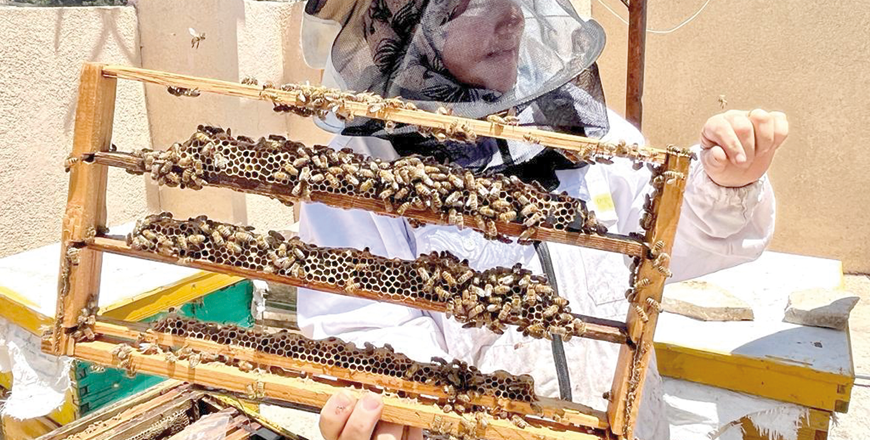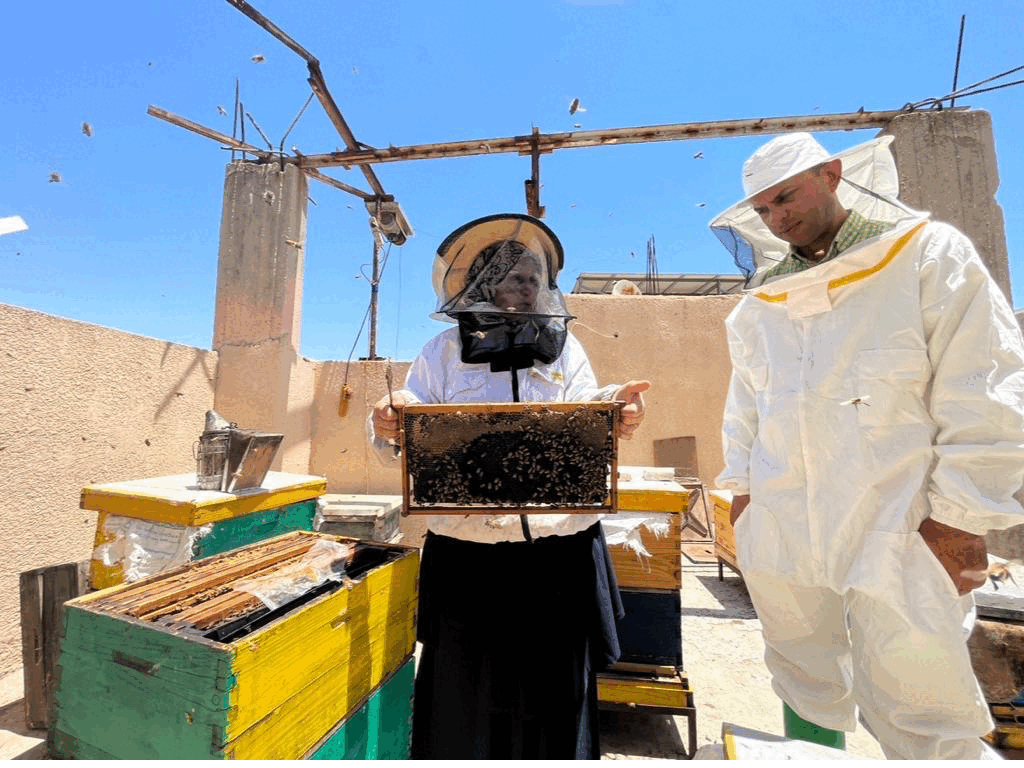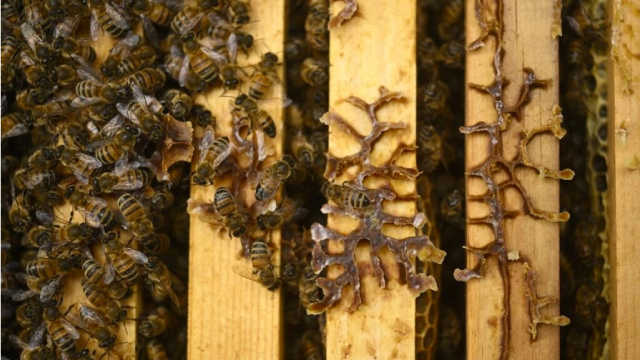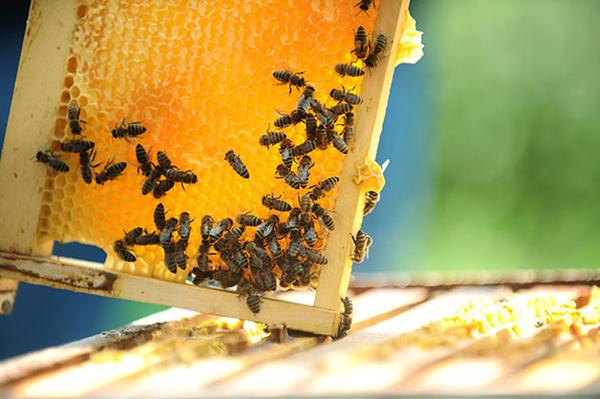You are here
Jordan’s honeybees: Unlikely heroes of food security stung by climate change
By Mohammad Ghazal - Aug 27,2023 - Last updated at Aug 27,2023

Muna Manfalouti at her beekeeping farm in Jerash in this recent photo (Photo by Isidora Ciric)
- Jordan is home to 3,000-3,500 beekeepers
- Fake honey sales leave sour note for farmers
- Extensive use of pesticides, water scarcity key challenges
JERASH — Around 48km north of Amman in Jerash Governorate, Muna Manfalouti, a beekeeper for nearly four decades, lives a life emblematic of both the undying spirit for Jordanian women and the stark toll of climate change on a treasured trade.
Manfalouti married young, her studies ceasing in the 12th grade. She never had the opportunity to grace the halls of a university — a detail that once filled her with resentment. Life in her husband's house in the remote region of Al Katteh was far from the urban hustle, without a trace of public transport or the conveniences of city life. Yet, this isolation ignited an ambition in Muna to use her time productively.
“I wanted to do something that would make me feel better, and also I wanted to help my husband. I did not want to be a housewife only,” she told The Jordan Times.
While visiting a friend in the governorate in 1988, Muna and her husband stumbled upon the art of beekeeping, which immediately kindled a lifelong interest in the pair.
Starting with three hives, Manfalouti, a self-taught enthusiast, began a deep dive into the world of bees. As she eagerly consumed books on the subject and implemented her findings, the passion project gradually grew into a business.
“I loved the idea and I started to read more about beekeeping, as we did not have social media at that time. I bought lots of books and I started to implement everything I had learned. My skills became stronger and I was more into the whole project,” she added.
Today, their estate brims with almost 200 beehives, which produce 4 kilogrammes of royal jelly per year.
Sting of reality
“This has not been an easy journey… climate change and many other factors negatively affected our business and the rest of beekeepers in Jordan… actually the climate change problem is something beekeepers face everywhere in the world, as bees are good not just for honey production, but for food security,” she added.
Climate change has drastically diminished honey yield over the last two decades, Muna explained. Each beehive used to produce around 15 kilogrammes of honey, which in recent years has plummeted to a meager 6-7 kilogrammes per season.
She recalled a time in 1991, when heavy snowfall blanketed their area. Despite the difficult weather, each beehive produced around 23 kilos of honey that year. The change is painfully evident.
Bees and food security
Demonstrably, bees and other pollinators are fundamental guardians of ecosystem health and food security, as their pollination instincts naturally maintain biodiversity, thereby ensuring the sustainable production of nutrient-dense crops. Most of the 25,000 to 30,000 species of insects in the order Hymenoptera, and specifically the thousands of species and subspecies of bees in the Apidae family, are extremely adept pollinators. Together with moths, flies, wasps, beetles and butterflies, these insects make up the majority of pollinating species.
Of the pollinating species, honeybees have an outsized effect on pollination, according to director general of the National Centre for Agricultural Research (NARC), Nizar Haddad. In recent press remarks, Haddad stressed that these creatures are far more important for their pollination abilities than their honey production.
A recent NARC study on specific crops in Jordan showed that pollinating insects contribute an estimated JD91.9 million ($130 million) in ecosystem services through their pollination of crops, representing one-third of the total production value of the 34 local crops studied.
Honeybees in particular contributed an estimated JD73.6 million in value due to their pollination habits, equivalent to around 27 per cent of the value of the studied crop production. This figure is also 26.3 times greater than the monetary value of local honey production, according to the study. The research also found that in the event that these insect pollinators were lost, the productivity of studied crops could decrease by approximately 35 per cent, a figure with likely ripple effects on food security.
Not only are honeybees powerful players in Jordan’s agriculture sector, but they are critical on a global scale. Nearly 90 per cent of the world’s wild flowering plant species depend entirely, or at least in part, on animal or insect pollination, along with more than 75 per cent of the world’s food crops and 35 per cent of global agricultural land. Pollinators also increase the outputs of 87 of the leading global food crops, in addition to many plant-derived medicines in our pharmacies.
In addition to their impact on crop yields and biodiversity, pollinating species also make an incredible impact on the economics of agriculture, as pollination-dependent crops are five times more valuable than those that do not require pollination. The annual price tag of global crops that directly rely on pollinators is estimated to be between $235 and $577 billion.
Bees under threat
According to recent reports by the Food and Agriculture Organisation (FAO), bee populations are declining, posing a threat to global food security and nutrition.
Bees and other pollinators are increasingly under threat from human activity, with the present species extinction rates at 100 to 1,000 times higher than average due to human causes. Close to 35 per cent of invertebrate pollinators, particularly bees and butterflies, and about 17 per cent of vertebrate pollinators, such as bats, face extinction globally.
If this trend continues, nutritious crops, such as fruits, nuts and many vegetable crops, will be increasingly substituted by less nutrient dense staple crops such as rice, corn and potatoes, eventually resulting in an imbalanced diet.
Intensive farming practices, land-use change, mono-cropping, pesticides and higher temperatures associated with climate change also threaten bee populations and, by extension, the quality of food we grow. These harmful practices harm the global bee population by reducing their access to food and nesting sites, exposing them to harmful chemicals and weakening their immune systems, according to FAO.
Climate challenges in Jordan’s bee industry
In Manfalouti’s decades of experience, she has witnessed erratic rainfall, shorter springs, severe heatwaves that scorch blossoms and green cover, as well as harsher autumns, which have altered the natural rhythms of the bees, and consequently, honey production.
In Jordan, there are around 3,000 to 3,500 beekeepers, mostly of whom are families that make their living from the profession, said Banan Esa Al Shagour, director of the Bee Research Directorate at NARC. Out of the all beekeepers in Jordan, a mere 25 are women, Shagour told The Jordan Times. Likewise, only around half of those in the industry, or 1,500 beekeepers, have licenses, Shagour said, adding that many who work in the beekeeping industry are housewives, retired persons, new graduates or residents of remote areas.
“Some use beekeeping to support their families and make a living, and some are hobbyists,” she said.
Like Manfalouti, Shagour has also seen the toll of climate change on the Jordanian bee industry. She noted that Jordan’s limited water resources, worsened by climate change, have been detrimental to vegetation and green cover, which has in turn harmed bee foraging.
Unstable temperatures have also hurt Jordan’s bee population, Shagour explained, stating, Another problem is that not all farmers plant trees on their land… The fluctuation in temperatures greatly affects bee behaviour and foraging… and that fluctuation affects the nectar and pollen of blooming plants,” she said.
“Sudden, heavy rainfall affects bees as well,” she added, noting that direct human factors such as urban sprawl and overgrazing only compound the issue.
NARC offers training workshops for bee keepers on topics such as honey storage and production techniques.
“We train them on how to diversify their products, and we train them on sensory analysis,” in order to quickly identify the needs of their respective hives, she said. According to Shagour, more must be done to support bee-focused research and assist the important work of Jordan’s beekeepers.
Back in Jerash, Manfalouti’s husband Ahmad Abu Drayyeh detailed the many factors, including climate change, that affected the family business.
“It used to rain around mid-September, and now it rains maybe in November or even December. Even when it rains, it is unlike before. The rain patterns have changed, and there is erratic rainfall that harms the soil and the plants sometimes. It used to rain until April, but now maybe we are lucky if it rains in March,” Abu Drayyeh told The Jordan Times.
“We have never seen heatwaves like we have been seeing over the past few years… Some flowers and vegetation get burnt at the start of the spring because of the high heat. This affects the bees and honey production,” he added.
Head of Jordan Beekeepers Union Mahmoud Arabyyat agreed that the change in rain patterns has affected production.
“Spring lasts for a shorter period of time, and the frequent fires in the forested areas of Ajloun, Jerash and elsewhere have affected this profession. Honey production certainly declined due to many factors, and one of the major factors is climate change,” Arabyyat told The Jordan Times.
Non-climate obstacles
While climate change and ecological instability loom over the bee industry, other challenges also plague the pollinators. Farmers’ extensive use of pesticides, a lack of awareness of the benefits of beehives in farms and the unregulated online honey sales are hurting the age-old profession.
“Climate change is just a part of the challenges that we face,” Arabyyat said. “Other challenges include the hobbyists who joined this profession and sell low-quality honey at much cheaper prices. The end-users do not have the ability to distinguish between the original honey and the low-quality one,” he added.
Arabyyat explained that Jordan’s professional beekeepers are also suffering from imported honey that is sold online.
Non-original honey is frequently falsely advertised on social media platforms at very cheap prices, he said, adding that on average, a kilo of original honey costs around JD14-JD16, but some advertisements have prices as low as JD5 and JD6.
Jordan’s beekeepers also must contend with certain farming practices, such as heavy pesticide use and a lack of vegetation on farms.
According to Arabyyat, some farmers actually remove grasses and vegetation from their land, which harms bee pollination.
In Abu Drayyeh’s experience, farmers sometimes use large quantities of toxic pesticides, which can kill bees. There is a need to raise awareness among farmers and reduce the prices of pesticides that do not include high concentrations of chemicals that are harmful to bees, he said.
“We need incentives and support for bee keepers. We need exemptions for fees and taxes on equipment that we need for beekeeping. We need better regulation of imported honey,” Abu Drayyeh said.
Hopes for the future
Muna, now a grandmother, harbours a dream of her children and grandchildren taking the family’s buzzing business forward. Despite the odds, she counts her journey as a success story. From humble beginnings with three hives to a thriving venture of 200, Muna’s beekeeping endeavour has enabled her to buy a plot of land, construct their house and send her children to university.
Muna’s story exemplifies the resilience of the human spirit against the ravages of climate change and socio-economic challenges. The power of her aspiration, as an early-married woman in a remote region of Jordan, allowed her to rise above her circumstances and build a beekeeping enterprise that not only sustains her family, but contributes to the domestic economy.
Despite the decline in honey production, Muna Manfalouti’s journey goes beyond survival, instead demonstrating to the thousands of beekeepers in Jordan that even in the face of climate change, one can still find ways to adapt, persevere, and succeed.
“I will not give up. I have worked hard for this project and I will continue learning to be able to mitigate the impact of climate change on my business as much as possible. I want my grandchildren to inherit and grow the businesses,” Manfalouti said.

Related Articles
AMMAN — World Bee Day, which falls annually on May 20, is celebrated this year virtually under the theme “Bee Engaged: Build Back Better for
QUIMPER, France — Bees pollinate 71 of the 100 crop species that provide 90 per cent of food worldwide.
SAN ANTONIO DE LOS BANOS, Cuba — Long known for its cigars and rum, Cuba has added organic honey to its list of key agricultural expor


















